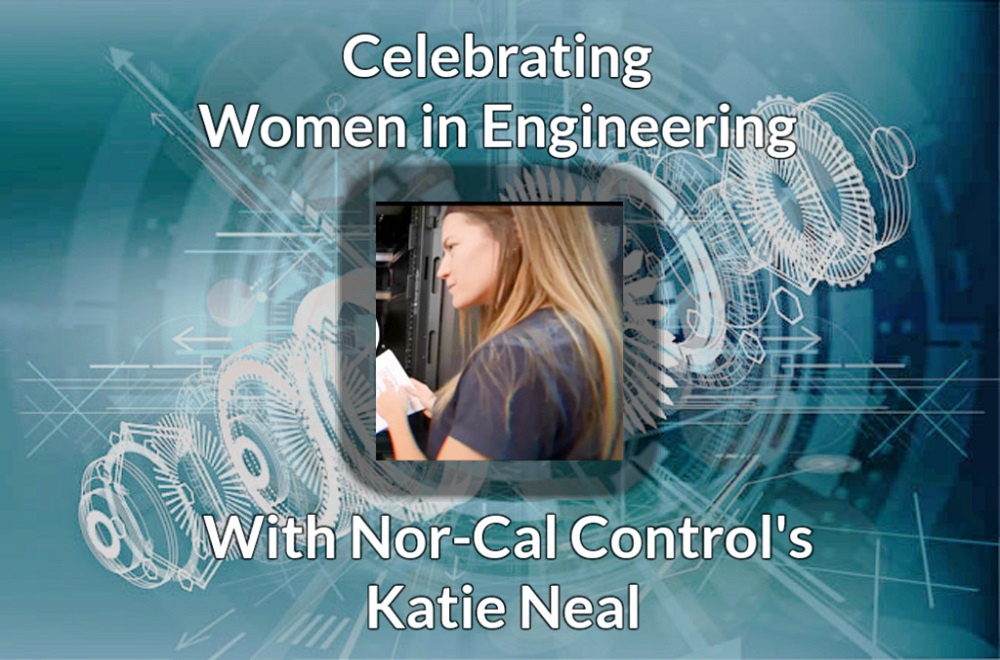March is Women's History Month! The first woman to be professionally employed as an electrical engineer was Edith Clarke. Born in 1883, she created the Clarke calculator for graphing electrical properties. Fast-forward to today, and more and more women are taking their rightful place in the engineering field.
One of these women is Katie Neal. Katie is an automation engineer and engineering team lead with Nor-Cal Controls. This Women's History Month, we want to recognize Katie and her accomplishments in the field of engineering.
The Path to an Engineering Career
Katie's path to engineering was fairly straightforward. Math was her favorite subject growing up; she enjoyed having a given set of knowns and unknowns and having to solve problems. Even outside the classroom, she spent much of her free time designing and building projects and working on puzzles of all kinds—activities she still enjoys today. By the time Katie graduated high school, she knew she would be pursuing an engineering degree in college.
Engineering soon proved to be the right career choice. Once she earned her degree and started her career, Katie found that the rewards of engineering were far greater than solving a puzzle or earning a good grade in math class. To this day she loves being able to see the tangible results of her and the Nor-Cal team's problem-solving and hard work out in the world.
Taking the Road Less Traveled
While Katie's initial journey to an engineering career was straightforward, she hasn't been afraid to detour from the standard path in search of learning opportunities.
Two years into her first engineering job designing residential and commercial solar systems, she encountered a serious challenge. She found it easy to design a system that checked all the engineering boxes of maximizing solar potential and meeting electrical code requirements. What wasn't always so easy was designing a system that was also the fastest to install, used the fewest parts, or produced the least amount of scrap at the end of the project.
Katie knew that in order to learn more about what she was designing, she needed to get hands-on experience. She left her engineering job to become a solar installer and eventual construction supervisor for three years. On the outside this may have looked like a step backwards in her engineering career, but she was able to learn and develop new skills she wouldn't have otherwise.
|
"I imagine it's easy to become incredibly confident once you've worked your way to a high position or level of skill or knowledge. But the best solutions aren't necessarily the standard or the ways you've always done something. Remaining humble and welcoming to alternatives or challenges is the best way to stay on the forefront of new technologies, strategies and opportunities."
– Katie Neal |
Leading the Way at Nor-Cal Controls
Katie's solutions-driven approach, dedication to process improvement, and passion for collaborative problem-solving make her the perfect fit for her role at Nor-Cal Controls. She models every day the company values of innovation, flexibility, and receptiveness to new ideas, and leads a diverse team dedicated to a shared goal and standard of work.
As an automation engineer and engineering team lead, Katie performs a variety of tasks in a typical day. Mornings are spent leading her team's Plan of the Day (POD) meeting and preparing for other meetings she or her team members have throughout the day. The remainder of her time is spent working on her own projects, helping her team members with their projects, and developing or updating standards and training materials for the engineering department.
The Future of Women in Engineering
While Katie has already achieved great success in her engineering career, she continuously challenges herself to learn, grow and innovate. She actively pursues new and better ways to create solutions.
That is at the core of her advice to women starting or considering an engineering career. In her own words:
|
"I encourage women in engineering to have confidence in their abilities and to seek out their own answers. Early in my career I was self-conscious that the engineers around me knew more than I did. When you feel this way it can prevent you from asking questions, suggesting ideas, or going for a promotion.
"My advice is to spend less time worrying about not knowing something and more time seeking out answers. Read a manual, find a YouTube video, get hands-on experience, or ask someone—don’t wait for someone to train you."
– Katie Neal |
Join the Nor-Cal Team
Engineer
NOUN. [En-Juh-Neer]
1. Solving problems, you didn't know you had in ways you can't understand.
See also, wizards, magician.
Proven engineering excellence and unparalleled customer support is #thenorcalway.
Join our team and apply today!





